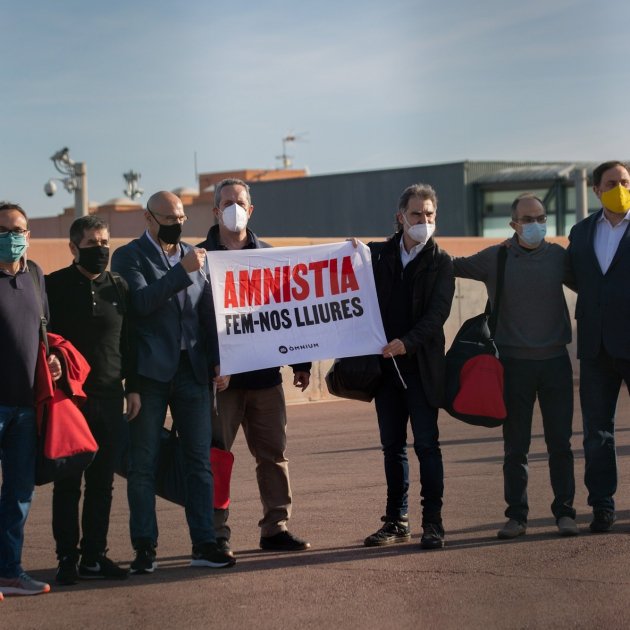They avoided entering the election campaign, but they are now stepping straight into the period of electoral pacts: the Spanish public prosecutor's office waited for the 14th February elections to the Parliament of Catalonia to be held before presenting their appeals against the Catalan prisoners' Level 3 prison leave regimes, and once again, locking up the political prisoners, Oriol Junqueras, Joaquim Forn, Raül Romeva, Josep Rull, Jordi Turull, Jordi Cuixart , Jordi Sànchez, Carme Forcadell and Dolors Bassa.
The Level 3 prison regime, allowing prisoners days and weekends out of their penitentaries, has lasted 14 days, exactly the period of the election campaign, and prosecutors have today released their appeal while the politicians are busy evaluating the election results. In the end it was the provincial prosecutors of Barcelona that signed the appeal, although, in order to expedite the procedures, it had been treated as coming directly from the prosecutors of the Spanish Supreme Court. Now the prison surveillance judge must decide whether, while the appeal is being resolved, justice should leave the political prisoners in their current, more relaxed leave regime, as happened in the second half of 2020 with Carme Forcadell and Dolors Bassa, or, on the contrary, if it will order them to return to prison in closed regime, as occurred with the other seven Catalan prisoners last July.
The prosecutors have requested that pending the resolution of the matter, the pro-independence leaders should immediate enter prison again, in a closed regime, as a preventive measure, and the comparison is made with rulings affecting members of ETA: "In the first place, if the purpose of the suspensive effect of the prosecution's appeal is to prevent prisoners sentenced to heavy sentences from being released, due to the obvious flight risk (let us recall that the legislative reform that established this was closely connected with highly dangerous prisoners belonging to the terrorist group ETA), it would not be logical for this suspensive effect to be postponed until the appeal itself was heard and not to interpret it as referring to the appeal 'initially lodged against the administrative decision,' for no matter how quickly the penitentiary surveillance judge tackled this 'appeal', the released prisoner would have plenty of time to flee anywhere in the world, thus leaving the intended purpose completely ineffective."
Prosecutors' appeal to the court to revoke the Level 3 prison leave regime of the prisoner "JV O" (Oriol Junqueras)
In all the Catalan political prisoners' cases, the prosecutors believe, virtually nothing has changed in comparison to the circumstances when the previous Level 3 prison regime was repealed six months ago. And therefore, the nine prisoners should continue in a closed prison regime: "No mention is made in the resolution appealed of any circumstances other than those contained in the ruling made 6 months ago and revoked only 40 days ago by the sentencing court, there is no reference in the resolution appealed or in the accompanying reports, as would have been pertinent, that the deficits indicated by this court for the revocation of the third degree had already been exceeded, because, in short, the reasons given by the Supreme Court remain fully in force, which is why this party alleges the same considerations which it alleged in its previous appeal."
In several almost identical appeals, each about 15 pages long, the prosecution criticizes the measures decided on by justice department officials in the Catalan government and considers that it cannot be correct to award all the prisoners the semi-open Level 3 regime at the same time, just a few weeks after the Supreme Court overturned it last December .
Prosecutors' appeal to the court to revoke the Level 3 prison leave regime of the prisoner "FCH J" (Joaquim Forn)
According to the prosecutors, the open Level 3 prison leave regime is "incompatible" with the fulfillment of the purpose of the sentence, especially the objectives of "re-education and resocialization". They also consider that among the prisoners there is a "lack of modification of personality traits directly related to criminal activity", as the inmates "continue to consider that the actions for which they were convicted are not criminal." The prosecutors reiterate, as in previous appeals, that there has been "insufficient progress in treatment" as the prisoners had not followed any treatment course.
As a result of all this, finally, the prosecutors' report concludes that "the positive aspects taken into account in the administrative resolution and in the proposal of the treatment board are not enough to agree on the progression to the Level 3 regime."
